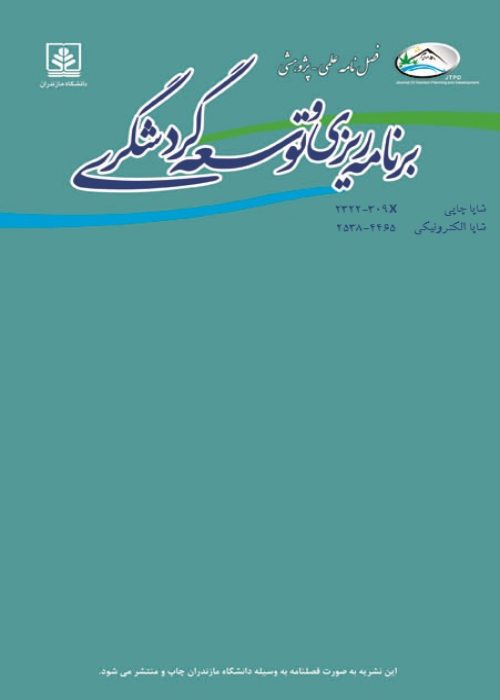The Role of Social Capital in Rural Tourism Development with Emphasis Second Home Case Study; Hesar Valiasr County, Boeinzahra Township
Abstract:
Introduction
Rural tourism is a recreational and social activity in rural areas that has great potential to improve the dynamics of rural development through poverty reduction، income generating and promoting the welfare of the community. Furthermore through numerous investments in rural areas it can have high impact on the transfer of knowledge، ideas and urban lifestyles and lead to diversification of their socio- economic activities. From the viewpoint of experts the use of rural spaces for recreation and leisure time could be analyzed in two ways: A) policies based on social tourism، and B) rural tourism based on second homes as a new lifestyle. Based on sustainable development approach، household assets to improve the livelihood of the local community includes a broad range of capitals forms such as natural، physical، human، financial and social capitals. Therefore social capital as an intangible investment is a facilitator development resources management based on social relationships and the function of local networks in different levels of the individual and the family، group and community. Thus، in the one hand، social capital dimensions (local network، participation، trust and cohesion) in the field of tourism، can promote stability of the social and economic development، comprehensive planning of tourism destinations، effective rapid assessment of complex situations، develop common values، guarantee an equal distribution of resources and increase understanding of the stakeholders، and in the other hand، it paves the way for new opportunities to encourage local residents invest in infrastructural services such as health، education and other social facilities that led to improve technical skills، communication، and trading. Now regarding the role of social capital in second home based rural tourism this study attempt to answer this question: Is there a significant relationship between social capital dimensions and Second home tourism development in rural areas? Materials And Methods
This paper attempts to study the role of social capital dimension such as (trust، solidarity and reciprocity and local networks) on the tourism development in rural areas. Methodology of this research is descriptive- analytical method and for the survey questioner form was used. The number of household of the survey includes 131 case settled in Hesar-e- Valiasre county (Boein Zahra Township in south east in province of Qazvin) villages who have lived permanently in four rural points. Due to the limited number and availability of all residents، all of them have been studied in the present study. Data was collected through a questionnaire in the form of a field study and through interviews with the families who live in four villages. The validity of the research is based upon its content and approval by experts. The final assessment was computed through Alpha Kronbach coefficient (α=0/8). Discussion and Results
In order to measure the role of social capital dimensions (local network، participation، trust and cohesion) in Rural Tourism Development with Emphasis on Second Home in study area، factor analysis in SPSS software was used. The foregoing items of the questionnaire included 35 items related to social capital dimensions have been reduced to 8 factors by the use of factor analysis، that 71. 74% of the variance is explained. Due to the suitability of the data sets and Significance of confidence level of 99% and reasonable amount of KMO Bartlett test، this test is a suitable instrument for data analysis. Conclusions
Descriptive findings from the survey show that 75. 2 percent of the 131 respondents were married، had a mean age 40. 5 years، 34. 6 percent of junior high school education، 69. 1% of the respondents were males and 25. 5 percent of main jobs were related to agriculture and 30% were retired. The consequence of data reduction by the use of factor analysis is showed as follows: 1-the interest and participation of individuals with 11. 61% of the variance، eigenvalue 4. 06; 2- Cultural factors with eigenvalues 3. 61 and 10. 31% of the variance in; 3- Collaboration and consultation with eigenvalues of 3. 49 and 9. 97% of the variance in; 4- agent cooperation and social relationships with eigenvalues 3. 24 and 9. 28% of variance; 5- the friendship and sympathy with eigenvalues 2. 48 and 7. 10% of the variance in; 6- Managing the interaction and collaboration among members with eigenvalues 2. 21 and 6. 32% of the variance of; 7- Managing social cohesion with eigenvalues 2. 11 and 6. 04% of the variance; and 8- honesty and trust factor with eigenvalues 1. 80 and 5. 15% of the variance. In the meantime، the first factor، personal interest and engagement with special values of 4. 06 and 11. 61% of the variance is accounted for in the can interpretation. that have the greatest impact on the development of tourism and second home development، investment rural community in the study area has and Minimum factor of prejudice that the eigenvalues of this factor is 1. 61، which is 4. 60% of the variance to calculate and explain.Language:
Persian
Published:
Journal of Tourism Planning and Development, Volume:2 Issue: 6, 2013
Pages:
52 to 74
magiran.com/p1215240
دانلود و مطالعه متن این مقاله با یکی از روشهای زیر امکان پذیر است:
اشتراک شخصی
با عضویت و پرداخت آنلاین حق اشتراک یکساله به مبلغ 1,390,000ريال میتوانید 70 عنوان مطلب دانلود کنید!
اشتراک سازمانی
به کتابخانه دانشگاه یا محل کار خود پیشنهاد کنید تا اشتراک سازمانی این پایگاه را برای دسترسی نامحدود همه کاربران به متن مطالب تهیه نمایند!
توجه!
- حق عضویت دریافتی صرف حمایت از نشریات عضو و نگهداری، تکمیل و توسعه مگیران میشود.
- پرداخت حق اشتراک و دانلود مقالات اجازه بازنشر آن در سایر رسانههای چاپی و دیجیتال را به کاربر نمیدهد.
In order to view content subscription is required
Personal subscription
Subscribe magiran.com for 70 € euros via PayPal and download 70 articles during a year.
Organization subscription
Please contact us to subscribe your university or library for unlimited access!



